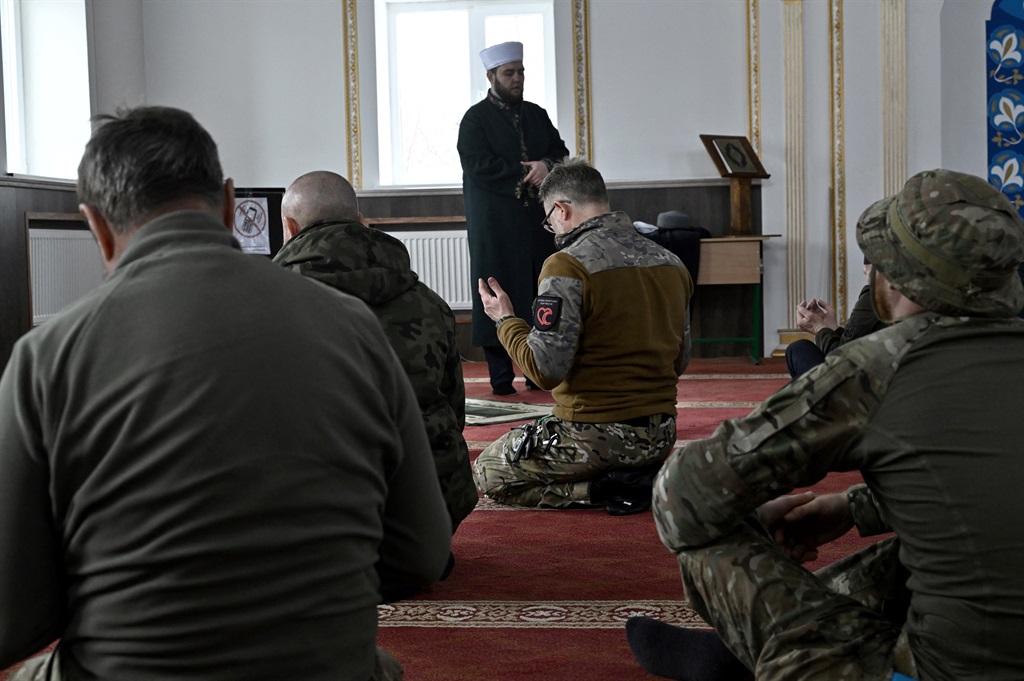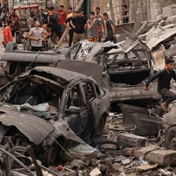
- Life continues in war-torn Ukraine as the country's Muslim population observes Ramadan.
- Heavy shelling has left many mosques empty or destroyed.
- Muslim soldiers in the Russian army are treated as 'cannon fodder', a Ukrainian soldier said.
Muslims are observing Ramadan in war-ridden Ukraine for a second year, and most people praying at a mosque near the eastern front line this week were soldiers in camouflage fatigues.
"I ask Allah to protect our mosque. I ask Allah to protect Ukraine... and to punish tyrants," Mullah Murat Suleymanov said in prayers for the holy month.
"Ramadan is a month of victory," he told the small congregation of 16 people, 11 of them in uniform, including one woman.
The mosque has numerous boarded-up broken windows and walls pitted by shrapnel. A rocket exploded nearby two days earlier.
Among the worshippers was Said Ismagilov, formerly one of Ukraine's Muslim spiritual leaders.
READ | Taliban closes Afghan women-run radio station for ‘playing music’ during Ramadan
When the war began, he quit and now works as an ambulance driver with volunteer paramedics, evacuating wounded soldiers from the front line.
Sandy-haired and wearing glasses, 44-year-old Ismagilov is a Tatar, a Muslim ethnic group.
He wore a sleeve patch from his ASAP Rescue battalion and showed his ambulance parked outside with taped-over dents caused by shrapnel.
'Allah's protection'
He said he feels "Allah's will and protection" amid the danger.
"There were times when my ambulance got riddled with shrapnel. Thank God, I wasn't injured."
When the war broke out, he served as mufti of Ukraine's Umma religious administration for 13 years.
But the mosque where he served emptied as many evacuated the area.
"I realised I was useless," he said, opting to "stand up and defend my motherland".
"Now I evacuate wounded people."
Last year he spent Ramadan in Lysychansk, a city that saw extremely heavy shelling before Ukraine's military eventually withdrew.
One of the most important Muslim festivals, Ramadan, requires believers to abstain from food and water from dawn to nightfall for a month.
Despite his wartime job, Ismagilov said he could still observe the Ramadan fasting rules.
Ismagilov said:
"I have all I need for fasting according to all Muslim traditions."
"I'm not in the trench now. I spend most of my daytime driving or at the stabilisation point," a building where paramedics take the wounded for initial medical care, he said.
He also tries to fit in a couple of hours of praying at night.
"It's hard for those Muslims who must stay in the trenches. They are cold, and there is a lot of water in the trenches as it often rains... It's hard to be a Muslim there," he said.
Ismagilov said he did not know how he would celebrate the end of Ramadan, Eid Al Fitr, later this month.
He said:
"If there is heavy shelling, we will probably gather in a basement to pray there."
Ismagilov grew up in the city of Donetsk in eastern Ukraine.
Intrigued by his family's Muslim heritage - which his parents knew little about - he went to study theology at an Islamic university in Moscow and later became an imam in Donetsk.
While he grew up in a largely Russian-speaking region, he now prefers to speak Ukrainian.
"I think it's disgusting when Russian Muslims support the war," he said.
Russia treats its ethnic minorities, many of them Muslims, as "people of low quality" and "uses them as cannon fodder" in the war, he said.
"It's no secret that most of the dead enemy soldiers are ethnically from Buryatia, Tuva, Dagestan, Tatarstan, and Chechnya," he said, naming Russian regions with large numbers of Muslims and Buddhists.
ALSO READ | Russia's invasion has caused $2.6bn in damage to Ukraine's cultural and heritage sites, says UN
"I'm absolutely sure that many Muslim fighters taking part in combat would like to fast... because in this case, they feel even better with Allah's help," the Mufti Suleymanov told AFP.
Dressed in long robes and a white hat, he was elected mufti last November, replacing Ismagilov.
A soldier standing outside the mosque said he was fasting and that most Muslim soldiers do, unless they are on combat missions.
"When you are going right to the very front line, it's permitted not to fast. If it's not hot and you're not tormented with thirst, then you can fast," he said.




 Publications
Publications
 Partners
Partners























